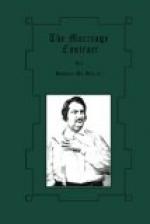The old gentleman took him every evening, in an old carriage drawn by ill-harnessed old horses, attended by ill-dressed old servants, to royalist houses, where he met a society composed of the relics of the parliamentary nobility and the martial nobility. These two nobilities coalescing after the Revolution, had now transformed themselves into a landed aristocracy. Crushed by the vast and swelling fortunes of the maritime cities, this Faubourg Saint-Germain of Bordeaux responded by lofty disdain to the sumptuous displays of commerce, government administrations, and the military. Too young to understand social distinctions and the necessities underlying the apparent assumption which they create, Paul was bored to death among these ancients, unaware that the connections of his youth would eventually secure to him that aristocratic pre-eminence which Frenchmen will forever desire.
He found some slight compensations for the dulness of these evenings in certain manual exercises which always delight young men, and which his father enjoined upon him. The old gentleman considered that to know the art of fencing and the use of arms, to ride well on horseback, to play tennis, to acquire good manners,—in short, to possess all the frivolous accomplishments of the old nobility,—made a young man of the present day a finished gentleman. Accordingly, Paul took a fencing-lesson every morning, went to the riding-school, and practised in a pistol-gallery. The rest of his time was spent in reading novels, for his father would never have allowed the more abstruse studies now considered necessary to finish an education.
So monotonous a life would soon have killed the poor youth if the death of the old man had not delivered him from this tyranny at the moment when it was becoming intolerable. Paul found himself in possession of considerable capital, accumulated by his father’s avarice, together with landed estates in the best possible condition. But he now held Bordeaux in horror; neither did he like Lanstrac, where his father had taken him to spend the summers, employing his whole time from morning till night in hunting.
As soon as the estate was fairly settled, the young heir, eager for enjoyment, bought consols with his capital, left the management of the landed property to old Mathias, his father’s notary, and spent the next six years away from Bordeaux. At first he was attached to the French embassy at Naples; after that he was secretary of legation at Madrid, and then in London,—making in this way the tour of Europe.
After seeing the world and life, after losing several illusions, after dissipating all the loose capital which his father had amassed, there came a time when, in order to continue his way of life, Paul was forced to draw upon the territorial revenues which his notary was laying by. At this critical moment, seized by one of the so-called virtuous impulses, he determined to leave Paris, return to Bordeaux, regulate his affairs, lead the life of a country gentleman at Lanstrac, improve his property, marry, and become, in the end, a deputy.




